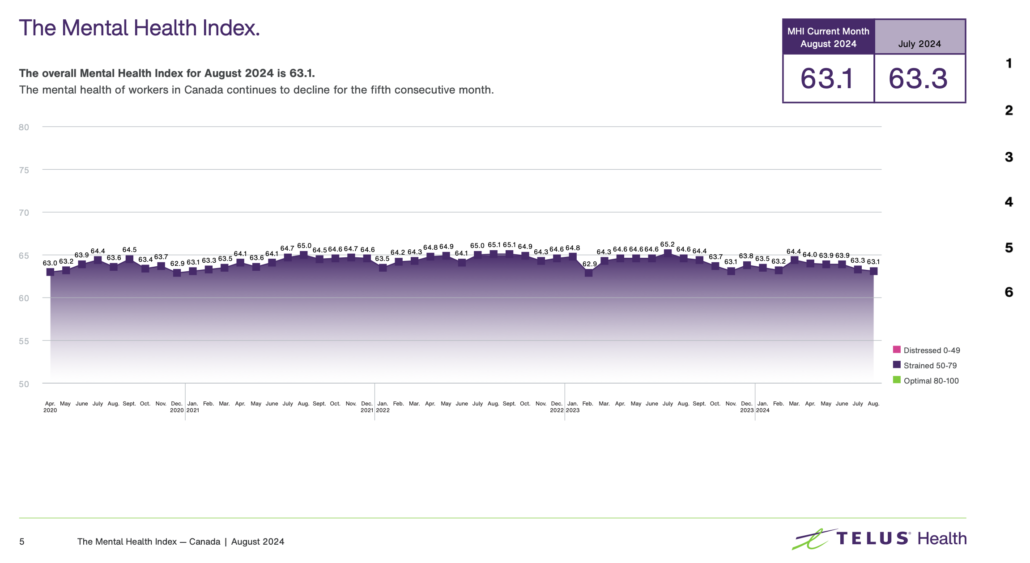Mental Health in Canadian Offices Reach Pandemic Low
Every month, Telus Health releases data from workplaces and organizations across Canada. The latest one, August, offers a confronting view of what’s happening in offices around the country.
If you’re looking to better your staff, improve mental health, and increase workplace happiness, it’s important to know the current statistics.
In this article, we’re diving in and sharing with you in the hopes that shedding light on the struggles will help make a change for those who are struggling.
The summer overview.
The mental health of workers in Canada declined for the fifth consecutive month, reaching pandemic-era lows; high mental health risk surpasses early pandemic levels.
35 percent of workers have a high mental health risk, 43 percent have a moderate mental health risk, and 22 percent have a low mental health risk. For more than two years, isolation as well as anxiety have been the highest factors of declining happiness.

How management plays a role.
Management plays an important role when it comes to employee well-being. Employees with unsupportive managers have been found to experience significantly lower mental health scores.
- 26 percent of workers say their manager does not prioritize mental health.
- 24 percent do not receive regular feedback and guidance
- 19 percent say their manager does not listen to their concerns
- 18 percent do not feel safe sharing their thoughts with their manager
- 17 percent do not trust their manage
- 6 percent feel their manager does not recognize their contributions
These numbers are important to read because workers with supportive management are at least twice as likely to recommend their workplace as a good place to work. They are also 65 percent more likely to believe they have a future at the company when a supportive manager is working above them.
What can managers do to change this?
While this information may feel anxiety-inducing, there are many things that managers and company owners can do to help reverse this downward spiral.
1. Create a supportive work environment
- Foster open communication: Encourage employees to speak openly about mental health without fear of judgment or repercussions. This can be achieved by normalizing discussions around mental well-being and actively listening to concerns.
- Be empathetic: Show understanding and compassion when employees face personal or professional challenges. Acknowledging their struggles and offering support can make a big difference.
- Encourage work-life balance: Promote a healthy work-life balance by respecting personal time, discouraging overwork, and ensuring employees have the opportunity to disconnect.
2. Recognize and address stressors
- Monitor workloads: Keep track of workloads to ensure that employees aren’t overwhelmed. If someone is consistently stressed or struggling, check in with them and offer help, whether that’s redistributing tasks or adjusting expectations.
- Offer flexibility: Flexibility in work hours, remote work, or deadlines can help alleviate stress. For some employees, flexible scheduling can be a game-changer for managing their mental health.
3. Lead by example
- Model healthy behaviours: As a manager, demonstrate healthy work habits like setting boundaries, taking breaks, and being open about mental health. Your behaviour can set a tone for the entire team.
- Normalize mental health conversations: Talk openly about your mental health when appropriate, which can help reduce stigma and encourage employees to seek help when they need it.
4. Check in regularly
- Frequent one-on-ones: Regular check-ins with employees (both professionally and personally) allow managers to identify potential signs of burnout, stress, or mental health struggles early on. Be a safe space where employees feel comfortable discussing any concerns.
- Offer peer support: Create opportunities for employees to connect, whether through team-building exercises or mentorship programs. Feeling connected to colleagues can be a significant mental health boost.
We are on your side.
Navigating a team of people with unique needs is a lot for a manager! Navy & Sage Benefits is here to help. We can send you mental health resources, switch up benefits packages to include more mental health offerings and even provide HR support for your team.
Give us a call today if you’re ready to improve the mental health of your employees.





